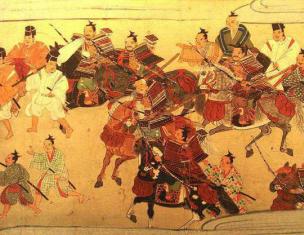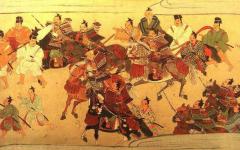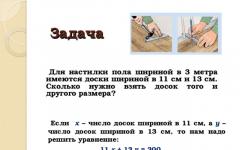Ivan Sergeevich Bolotin - Russian sociologist, teacher, Doctor of Sociological Sciences, professor, head of the department of “Sociology and Personnel Management” of the Russian State University of Technology them. K.E. Tsiolkovsky (MATI). Honored Worker high school Russian Federation.
Ivan Sergeevich was born on May 20, 1940 in the village of Petrovo, Tula region. His father, Sergei Alekseevich Bolotin (1918-1941) worked as a field foreman before the war. During the Second World War he died at the front. Mother, Vera Mikhailovna Bolotina (1913-1994), worked on a collective farm for many years.
Ivan Sergeevich from 1957 to 1959 studied at Railway School No. 2, in Tula.
In 1959-1960 He first worked as a senior track worker, and then as a track foreman in the Kazakh SSR.
In 1961-1964. Ivan Sergeevich serves in Soviet Army, receives the rank of "sergeant".
After the army, in 1964, he entered the Faculty of Philosophy of Moscow state university them. M.V. Lomonosov. Completes his studies in 1971.
In 1969-1971. He holds the position of consultant to the office of political education of the Perovsky district committee of the CPSU in Moscow.
In 1971-1973. Bolotin becomes a junior research fellow at the Department of Scientific Communism natural faculties Moscow State University named after M.V. Lomonosov.
In 1975, Ivan Sergeevich defended his dissertation for the academic degree candidate of philosophical sciences on the topic: “Criticism of the clerical falsification of the solution to the national question in the USSR.”
In the same year, Bolotin became a senior researcher at the Research Institute for Higher School Problems of the USSR Ministry of Higher and Secondary Special Education.
Since 1979 to 1985 - Associate Professor of the Moscow Regional pedagogical institute them. N.K. Krupskaya.
In 1985, Bolotin became the head of the department of the Problem Research Laboratory of Student Youth at Moscow State University.
In 1987, Ivan Sergeevich held the position of leading researcher at Moscow State University.
In 1993, Bolotin defended his dissertation for the degree of Doctor of Sociological Sciences on the topic: “Spiritual foundations of the continuity of generations.”
Since 1994, Ivan Sergeevich has become the head of the department of Sociology and Personnel Management at MATI - Russian State Technical University named after. K.E. Tsiolkovsky.
In 1995, Bolotin was awarded academic title professor in the specialty "Sociology".
In addition, I.S. Bolotin conducts active scientific and social work. In 1987, he became co-chairman of the Committee on the problem of “Brain drain from the USSR (Russia)”, and the international conference “Brain drain from Russia: problems and prospects” (Vatutinki, 1992) held by him marked the beginning of a broad study of this problem.
Since 1992, Ivan Sergeevich has been a member of the Presidium of the International Pedagogical Academy, uniting scientists and teachers from Russia and the CIS, Head of the Interuniversity Center for Sociological Education, member of the editorial board of the journal of the Ministry of Education and Science of the Russian Federation " Higher education in Russia."
Ivan Sergeevich is married, has two daughters and a granddaughter.
IN free time Bolotin devotes himself to traveling and caring for his dacha garden.
›Ivan Sergeevich Bolotin(born May 20, 1940, Petrovo village, Belevsky district, Tula region, RSFSR) - Russian sociologist, teacher, Doctor of Sociological Sciences, professor, head of the department of Sociology and Personnel Management at MATI - Russian State Technological University. K. E. Tsiolkovsky. Honored Worker of Higher School of the Russian Federation.
BiographyOrigin
Descendant of state peasants of the Belevsky district of the Tula province. Grandfather, Alexey Vasilyevich Bolotin (c. 1885 - 1946), an expert in carpentry, was almost repressed at the beginning of collectivization, since the family lived in abundance. The regional Soviet leadership, taking into account the shortage of trained personnel, nevertheless changed their anger to mercy and instructed an experienced master to organize a collective farm. A.V. Bolotin became the chairman of the collective farm and brought his son into the work. Ivan Sergeevich’s father, Sergei Alekseevich Bolotin (1918-1941), worked as a field foreman before the war. At the beginning of the Great Patriotic War he died at the front. Mother, Vera Mikhailovna Bolotina (1913-1994), worked on a collective farm for many years.
Chronicle of creative life- May 20, 1940: I.S. Bolotin was born in the village of Petrovo, Belevsky district, Tula region, RSFSR;
- 1957-1959: studies at Railway School No. 2, Tula;
- 1959-1960: senior track worker, track foreman - Tselinograd region, Kazakh SSR;
- 1960-1961: worker, teacher in trust No. 1 of Glavgaz of the USSR, Serpukhov, Moscow region;
- 1961-1964: service in the Soviet Army, sergeant;
- 1964-1969: studied at the Faculty of Philosophy of Moscow State University. M.V. Lomonosov;
- 1969-1971: consultant to the office of political education of the Perovsky district committee of the CPSU, Moscow;
- 1971-1973: junior researcher at the department of scientific communism of the natural faculties of Moscow State University. M.V. Lomonosov;
- 1973-1975: director of the branch of the University of Marxism-Leninism of the Moscow City Committee of the CPSU under the party committee of Moscow State University;
- 1975: defended his dissertation for the degree of Candidate of Philosophical Sciences on the topic: “Criticism of the clerical falsification of the solution to the national question in the USSR”;
- 1975-1979: senior researcher at the Research Institute for Higher School Problems of the Ministry of Higher and Secondary Special Education of the USSR;
- 1979-1985: Associate Professor at the Moscow Regional Pedagogical Institute named after. N.K. Krupskaya;
- 1985-1987: head of the department of the Problem Research Laboratory of Student Youth at Moscow State University;
- 1987-1994: leading researcher at Moscow State University;
- 1993: defended his dissertation for the degree of Doctor of Sociological Sciences on the topic: “Spiritual foundations of the continuity of generations”;
- since 1994: Head of the Department of Sociology and Personnel Management at MATI - Russian State Technical University named after. K.E. Tsiolkovsky;
- simultaneously with work at MATI I.S. Bolotin organized the department of “History and Philosophy” in a non-state educational institution"Moscow Institute of Economics, Management and Law", which he headed for a number of years;
- 1995: awarded the academic title of professor in the specialty “Sociology”.
I.S. Bolotin is a well-known scientist in Russia and abroad in the field of sociology of education and sociology of management, specializing in the field of social technologies of management in educational systems. Currently, his interests are concentrated around the training of personnel management specialists, primarily its social and humanitarian component. Author of more than 100 scientific and methodological works, including three monographs. Under the scientific guidance of I.S. Bolotin has prepared 2 doctoral and 14 candidate dissertations on educational issues; he is a member of three dissertation councils.
In the 1980s, I.S. Bolotin was one of the initiators of the humanitarization of higher technical education. On his initiative, the following departments were created at MATI:
- sociology and law,
- state and municipal government and jurisprudence,
- sociology and personnel management,
Training of specialists in the specialty “Human Resources Management” has been opened.
I.S. Bolotin conducts active scientific and social work. In 1987-1994, he was co-chairman of the Committee on the problem of “Brain drain from the USSR (Russia)”. Conducted by I.S. Bolotin's international conference “Brain drain from Russia: problems and prospects” (Vatutinki, 1992) marked the beginning of a broad study of this problem. The materials of this international conference were presented to the Administration of the President of Russia and published on official languages UNESCO. In 1993, on behalf of UNESCO under the leadership of I.S. Bolotin conducted a study “Brain drain from Russia: 93”, the results of which were discussed at a meeting of ROSTE (UNESCO Regional Office for Science and Technology for Europe).
Since 1992 I.S. Bolotin - full member and a member of the Presidium of the International Pedagogical Academy, uniting scientists and teachers from Russia and the CIS. Head of the Interuniversity Center for Sociological Education, under whose auspices conferences are held annually on the problems of social and humanitarian education of students. Member of the editorial board of the journal of the Ministry of Education and Science of the Russian Federation “Higher Education in Russia”.
A significant contribution is made by I.S. Bolotin in the development of social technologies - a new direction in the field of managing social processes. On the initiative and with the participation of Professor Bolotin, Belgorod State University, which is the main center for the study and implementation of social technologies in Russia, regularly conducts readings “Formation and development of the socio-technological culture of a specialist.”
Family, leisureWife, Lyubov Aleksandrovna Bolotina (born 1946) - candidate pedagogical sciences, professor. The eldest daughter, Arina Ivanovna Merkulova (born 1969) is a journalist, graduated from Moscow State University. The youngest daughter, Daria Ivanovna Bolotina (born 1980) is a candidate of cultural studies, literary editor of an Orthodox publishing house. Granddaughter, Anna Merkulova (born 1994) is a student at the College of Information Technology.
Ivan Sergeevich devotes his short free time from work to traveling and caring for the garden at his dacha.
Confession- Medal “For Valiant Labor. In commemoration of the 100th anniversary of the birth of V.I. Lenin", 1970.
- Silver medal named after Y.A. Comenius International Pedagogical Academy - for his contribution to the development of education, 2000.
- Honored Worker of Higher School of the Russian Federation, 2005.
- Diploma of the "Regained Generation" award of the Russian Orthodox Church, 2006.
- Honorary Professor of the Moscow Institute of Economics, Management and Law, 2006.
- Bolotin I. S. The place of sociology in the system of social and humanitarian training of specialists. - Sociological education in Russia: results, problems, prospects. Theses of the All-Russian scientific conference, dedicated to the 275th anniversary of St. Petersburg State University. - St. Petersburg. , 1998.
- Bolotin I. S. Social technologies in the 21st century. Theses of the 1st All-Russian Sociological Congress “Society and Sociology: New Realities and New Ideas.” - St. Petersburg. , 2000.
- Bolotin I. S. Elite and intelligentsia in transforming Russia. Life styles and practices of the intelligentsia. / Collection of articles. Edited by Zh. T. Toshchenko. - M., 2002.
- Bolotin I. S. Social features modern higher education in Russia. Social functions of higher education: past and present. / Collection of scientific works. Edited by I. S. Bolotin. - M.: MATI Publishing House, 2003.
- Bolotin I. S., Dzhamaludinov G. M. Sociology of education. / Monograph. - M.: Economics and Finance, 2004.
- Bolotin I. S., Zmeev V. A., Petrov A. P. MATI: Novosibirsk stage of life. // Magazine “Higher Education in Russia”. - No. 5, 2005.
- Bolotin I. S., Khovrin A. Yu. Social partnership in youth policy. // Integration of education. - No. 2, 2005.
- Bolotin I. S. Higher education today: management problems. // Magazine “Higher Education in Russia”. - No. 2, 2006.
- Introduction to the specialty “Human Resources Manager”. Tutorial. / Scientifically edited by I. S. Bolotin. - M.: MATI Publishing House, 2008.
- Glossary of terms in personnel management. / Scientifically edited by I. S. Bolotin. - M.: MATI Publishing House, 2009.
- Basalai S. I., Bolotin I. S., Nikolaeva M. E. Economics and sociology of labor. Study guide. - M.: MATI Publishing House, 2010.
- Bolotin I. S., Timoshkina N. A. Psychology and pedagogy. Study guide. - M.: MATI Publishing House, 2010.
Ivan Sergeevich Bolotin(born May 20, 1940, Petrovo village, Belevsky district, Tula region, RSFSR) - Russian sociologist, teacher, Doctor of Sociological Sciences, professor, head of the department of Sociology and Personnel Management at MATI - Russian State Technological University. K. E. Tsiolkovsky. Honored Worker of Higher School of the Russian Federation.
Biography
Origin
Descendant of state peasants of the Belevsky district of the Tula province. Grandfather, Alexey Vasilyevich Bolotin (c. 1885 - 1946), an expert in carpentry, was almost repressed at the beginning of collectivization, since the family lived in abundance. The regional Soviet leadership, taking into account the shortage of trained personnel, nevertheless changed their anger to mercy and instructed an experienced master to organize a collective farm. A.V. Bolotin became the chairman of the collective farm and brought his son into the work. Ivan Sergeevich’s father, Sergei Alekseevich Bolotin (1918-1941), worked as a field foreman before the war. At the beginning of the Great Patriotic War, he died at the front. Mother, Vera Mikhailovna Bolotina (1913-1994), worked on a collective farm for many years.
Chronicle of creative life
- May 20, 1940: I.S. Bolotin was born in the village of Petrovo, Belevsky district, Tula region, RSFSR;
- 1957-1959: studies at Railway School No. 2, Tula;
- 1959-1960: senior track worker, track foreman - Tselinograd region, Kazakh SSR;
- 1960-1961: worker, teacher in trust No. 1 of Glavgaz of the USSR, Serpukhov, Moscow region;
- 1961-1964: service in the Soviet Army, sergeant;
- 1964-1969: studied at the Faculty of Philosophy of Moscow State University. M.V. Lomonosov;
- 1969-1971: consultant to the office of political education of the Perovsky district committee of the CPSU, Moscow;
- 1971-1973: junior researcher at the department of scientific communism of the natural faculties of Moscow State University. M.V. Lomonosov;
- 1973-1975: director of the branch of the University of Marxism-Leninism of the Moscow City Committee of the CPSU under the party committee of Moscow State University;
- 1975: defended his dissertation for the degree of Candidate of Philosophical Sciences on the topic: “Criticism of the clerical falsification of the solution to the national question in the USSR”;
- 1975-1979: senior researcher at the Research Institute for Higher School Problems of the Ministry of Higher and Secondary Special Education of the USSR;
- 1979-1985: Associate Professor at the Moscow Regional Pedagogical Institute named after. N.K. Krupskaya;
- 1985-1987: head of the department of the Problem Research Laboratory of Student Youth at Moscow State University;
- 1987-1994: leading researcher at Moscow State University;
- 1993: defended his dissertation for the degree of Doctor of Sociological Sciences on the topic: “Spiritual foundations of the continuity of generations”;
- since 1994: Head of the Department of Sociology and Personnel Management at MATI - Russian State Technical University named after. K.E. Tsiolkovsky;
- simultaneously with work at MATI I.S. Bolotin organized the Department of History and Philosophy at the non-state educational institution Moscow Institute of Economics, Management and Law, which he headed for a number of years;
- 1995: awarded the academic title of professor in the specialty “Sociology”.
Scientific and pedagogical activities
I.S. Bolotin is a well-known scientist in Russia and abroad in the field of sociology of education and sociology of management, specializing in the field of social technologies of management in educational systems. Currently, his interests are concentrated around the training of personnel management specialists, primarily its social and humanitarian component. Author of more than 100 scientific and methodological works, including three monographs. Under the scientific guidance of I.S. Bolotin has prepared 2 doctoral and 14 candidate dissertations on educational issues; he is a member of three dissertation councils.
In the 1980s, I.S. Bolotin was one of the initiators of the humanitarization of higher technical education. On his initiative, the following departments were created at MATI:
- sociology and law,
- state and municipal administration and jurisprudence,
- sociology and personnel management,
Plan:
- Introduction
- 1 Biography
- 1.1 Origin
- 1.2 Chronicle of creative life
- 1.3 Scientific and pedagogical activities
- 1.4 Family, leisure
- 1.5 Recognition
- 2 List of the most famous scientific works Literature
Notes
Introduction
Ivan Sergeevich Bolotin(born May 20, 1940, Petrovo village, Belevsky district, Tula region, RSFSR) - Russian sociologist, teacher, Doctor of Sociological Sciences, professor, head of the department of Sociology and Personnel Management at MATI - Russian State Technological University. K.E. Tsiolkovsky. Honored Worker of Higher School of the Russian Federation.
1. Biography
1.1. Origin
Descendant of state peasants of the Belevsky district of the Tula province. Grandfather, Alexey Vasilyevich Bolotin (c. 1885-1946), an expert in carpentry, was almost repressed at the beginning of collectivization, since the family lived in abundance. The regional Soviet leadership, taking into account the shortage of trained personnel, nevertheless changed their anger to mercy and instructed an experienced master to organize a collective farm. A.V. Bolotin became the chairman of the collective farm and brought his son into the work. Ivan Sergeevich’s father, Sergei Alekseevich Bolotin (1918-1941), worked as a field foreman before the war. At the beginning of the Great Patriotic War, he died at the front. Mother, Vera Mikhailovna Bolotina (1913-1994), worked on a collective farm for many years.
1.2. Chronicle of creative life
- May 20, 1940: I.S. Bolotin was born in the village of Petrovo, Belevsky district, Tula region, RSFSR;
- 1957-1959: studies at Railway School No. 2, Tula;
- 1959-1960: senior track worker, track foreman - Tselinograd region, Kazakh SSR;
- 1960-1961: worker, teacher in trust No. 1 of Glavgaz of the USSR, Serpukhov, Moscow region;
- 1961-1964: service in the Soviet Army, sergeant;
- 1964-1969: studied at the Faculty of Philosophy of Moscow State University. M.V. Lomonosov;
- 1969-1971: consultant to the office of political education of the Perovsky district committee of the CPSU, Moscow;
- 1971-1973: junior researcher at the department of scientific communism of the natural faculties of Moscow State University. M.V. Lomonosov;
- 1973-1975: director of the branch of the University of Marxism-Leninism of the Moscow City Committee of the CPSU under the party committee of Moscow State University;
- 1975: defended his dissertation for the degree of Candidate of Philosophical Sciences on the topic: “Criticism of the clerical falsification of the solution to the national question in the USSR”;
- 1975-1979: senior researcher at the Research Institute for Higher School Problems of the Ministry of Higher and Secondary Special Education of the USSR;
- 1979-1985: Associate Professor at the Moscow Regional Pedagogical Institute named after. N.K. Krupskaya;
- 1985-1987: head of the department of the Problem Research Laboratory of Student Youth at Moscow State University;
- 1987-1994: leading researcher at Moscow State University;
- 1993: defended his dissertation for the degree of Doctor of Sociological Sciences on the topic: “Spiritual foundations of the continuity of generations”;
- since 1994: Head of the Department of Sociology and Personnel Management at MATI - Russian State Technical University named after. K.E. Tsiolkovsky;
- simultaneously with work at MATI I.S. Bolotin organized the Department of History and Philosophy at the non-state educational institution Moscow Institute of Economics, Management and Law, which he headed for a number of years;
- 1995: awarded the academic title of professor in the specialty “Sociology”.
1.3. Scientific and pedagogical activities
I.S. Bolotin is a well-known scientist in Russia and abroad in the field of sociology of education and sociology of management, specializing in the field of social technologies of management in educational systems. Currently, his interests are concentrated around the training of personnel management specialists, primarily its social and humanitarian component. Author of more than 100 scientific and methodological works, including three monographs. Under the scientific guidance of I.S. Bolotin has prepared 2 doctoral and 14 candidate dissertations on educational issues; he is a member of three dissertation councils.
In the 1980s, I.S. Bolotin was one of the initiators of the humanitarization of higher technical education. On his initiative, the following departments were created at MATI:
- sociology and law,
- state and municipal administration and jurisprudence,
- sociology and personnel management,
Training of specialists in the specialty “Human Resources Management” has been opened.
I.S. Bolotin conducts active scientific and social work. In 1987-1994, he was co-chairman of the Committee on the problem of “Brain drain from the USSR (Russia)”. Conducted by I.S. Bolotin's international conference “Brain drain from Russia: problems and prospects” (Vatutinki, 1992) marked the beginning of a broad study of this problem. The materials of this international conference were presented to the Administration of the President of Russia and published in the official languages of UNESCO. In 1993, on behalf of UNESCO under the leadership of I.S. Bolotin conducted a study “Brain drain from Russia: 93”, the results of which were discussed at a meeting of ROSTE (UNESCO Regional Office for Science and Technology for Europe).
Since 1992 I.S. Bolotin is a full member and member of the Presidium of the International Pedagogical Academy, uniting scientists and teachers from Russia and the CIS. Head of the Interuniversity Center for Sociological Education, under whose auspices conferences are held annually on the problems of social and humanitarian education of students. Member of the editorial board of the journal of the Ministry of Education and Science of the Russian Federation “Higher Education in Russia”.
A significant contribution is made by I.S. Bolotin in the development of social technologies - a new direction in the field of managing social processes. On the initiative and with the participation of Professor Bolotin, Belgorod State University, which is the main center for the study and implementation of social technologies in Russia, regularly conducts readings “Formation and development of the socio-technological culture of a specialist.”
1.4. Family, leisure
Wife, Lyubov Aleksandrovna Bolotina (born 1946) - candidate of pedagogical sciences, professor. The eldest daughter, Arina Ivanovna Merkulova (born 1969) is a journalist, graduated from Moscow State University. The youngest daughter, Daria Ivanovna Bolotina (born 1980) is a candidate of cultural studies, literary editor of an Orthodox publishing house. Granddaughter, Anna Merkulova (born 1994) is a student at the College of Information Technology.
Ivan Sergeevich devotes his short free time from work to traveling and caring for the garden at his dacha.
1.5. Confession
- Medal “For Valiant Labor. In commemoration of the 100th anniversary of the birth of V.I. Lenin", 1970.
- Silver medal named after Y.A. Comenius International Pedagogical Academy - for his contribution to the development of education, 2000.
- Honored Worker of Higher School of the Russian Federation, 2005.
- Diploma of the “Regained Generation” award of the Russian Orthodox Church, 2006.
- Honorary Professor of the Moscow Institute of Economics, Management and Law, 2006.
2. List of the most famous scientific works
- I.S. Bolotin. The place of sociology in the system of social and humanitarian training of specialists. - Sociological education in Russia: results, problems, prospects. Abstracts of the All-Russian scientific conference dedicated to the 275th anniversary of St. Petersburg State University. St. Petersburg, 1998.
- I.S. Bolotin. Social technologies in the 21st century. - Theses of the 1st All-Russian Sociological Congress “Society and Sociology: New Realities and New Ideas.” St. Petersburg, 2000.
- I.S. Bolotin. Elite and intelligentsia in transforming Russia. - Life styles and practices of the intelligentsia. Collection of articles. Edited by Zh.T. Toshchenko. Moscow, 2002.
- I.S. Bolotin. Social functions of modern higher education in Russia. - Social functions of higher education: past and present. Collection of scientific works. Edited by I.S. Swamp. Moscow, MATI Publishing House, 2003.
- I.S. Bolotin, G.M. Dzhamaludinov. Sociology of education. Monograph. - Moscow, Economics and Finance, 2004.
- I.S. Bolotin, V.A. Zmeev, A.P. Petrov. MATI: Novosibirsk stage of life. - Magazine “Higher Education in Russia”, No. 5, 2005.
- I.S. Bolotin, A.Yu. Khovrin. Social partnership in youth policy. - Integration of Education, No. 2, 2005.
- I.S. Bolotin. Higher education today: management problems. - Magazine “Higher Education in Russia”, No. 2, 2006.
- Introduction to the specialty “Human Resources Manager”. Study guide. - Moscow, MATI Publishing House, 2008.
- Scientifically edited by I.S. Swamp. Glossary of terms in personnel management. - Moscow, MATI Publishing House, 2009.
- S.I. Basalai, I.S. Bolotin, M.E. Nikolaev. Economics and sociology of labor. Study guide. - Moscow, MATI Publishing House, 2010.
- I.S. Bolotin, N.A. Timoshkina. Psychology and pedagogy. Study guide. - Moscow, MATI Publishing House, 2010.
Literature
- History of "MATI" - Russian State Technological University named after K.E. Tsiolkovsky. Part two. 1961-2000. - Moscow, RIK Rusanova, 2007. ISBN 5-93443-711-9. Page 420, 463, 532.
Notes
- Decree of the President of the Russian Federation of September 23, 2005 No. 1116 “On conferring honorary titles of the Russian Federation” - www.rg.ru/2005/09/29/ukaz-doc.html
This abstract is based on an article from Russian Wikipedia. Synchronization completed 07/14/11 15:26:25
Similar abstracts:
Ivan Sergeevich Bolotin(born May 20, Petrovo village, Belevsky district, Tula region, RSFSR) - Russian sociologist, teacher, Doctor of Sociological Sciences, professor, head of the department of “Sociology and Personnel Management” at MATI - Russian State Technological University. K. E. Tsiolkovsky. Honored Worker of Higher School of the Russian Federation.
Biography
Origin
In the years I.S. Bolotin was one of the initiators of the humanitarization of higher technical education. On his initiative, the following departments were created at MATI:
- sociology and law,
- state and municipal administration and jurisprudence,
- sociology and personnel management,
Training of specialists in the specialty “Human Resources Management” has been opened.
I.S. Bolotin conducts active scientific and social work. B - he was the co-chairman of the Committee on the problem of “Brain drain from the USSR (Russia)”. Conducted by I.S. Bolotin’s international conference “Brain drain from Russia: problems and prospects” (, ) marked the beginning of a broad study of this problem. The materials of this international conference were presented to the Administration of the President of Russia and published in the official languages of UNESCO. On behalf of UNESCO under the leadership of I.S. Bolotin conducted a study “Brain drain from Russia: 93”, the results of which were discussed at a meeting of ROSTE (UNESCO Regional Office for Science and Technology for Europe).
Since 1992 I.S. Bolotin is a full member and member of the Presidium of the International Pedagogical Academy, uniting scientists and teachers from Russia and the CIS. Head of the Interuniversity Center for Sociological Education, under whose auspices conferences are held annually on the problems of social and humanitarian education of students. Member of the editorial board of the journal of the Ministry of Education and Science of the Russian Federation “Higher Education in Russia”.
A significant contribution is made by I.S. Bolotin in the development of social technologies - a new direction in the field of managing social processes. On the initiative and with the participation of Professor Bolotin, Belgorod State University, which is the main center for the study and implementation of social technologies in Russia, regularly conducts readings “Formation and development of the socio-technological culture of a specialist.”
Family, leisure
Wife, Lyubov Aleksandrovna Bolotina (b.) - candidate of pedagogical sciences, professor. The eldest daughter, Arina Ivanovna Merkulova (b.) is a journalist, graduated from Moscow State University. The youngest daughter, Daria Ivanovna Bolotina (born) is a candidate of cultural studies, literary editor of an Orthodox publishing house. Granddaughter, Anna Merkulova (b.) is a student at the College of Information Technology.
Ivan Sergeevich devotes his short free time from work to traveling and caring for the garden at his dacha.
Confession
List of the most famous scientific works
- Bolotin I. S. The place of sociology in the system of social and humanitarian training of specialists. - Sociological education in Russia: results, problems, prospects. Abstracts of the All-Russian scientific conference dedicated to the 275th anniversary of St. Petersburg State University. - St. Petersburg. , 1998.
- Bolotin I. S. Social technologies in the 21st century. Theses of the 1st All-Russian Sociological Congress “Society and Sociology: New Realities and New Ideas.” - St. Petersburg. , 2000.
- Bolotin I. S. Elite and intelligentsia in transforming Russia. Life styles and practices of the intelligentsia. / Collection of articles. Edited by Zh. T. Toshchenko. - M., 2002.
- Bolotin I. S. Social functions of modern higher education in Russia. Social functions of higher education: past and present. / Collection of scientific works. Edited by I. S. Bolotin. - M.: MATI Publishing House, 2003.
- Bolotin I. S., Dzhamaludinov G. M. Sociology of education. / Monograph. - M.: Economics and Finance, 2004.
- Bolotin I. S., Zmeev V. A., Petrov A. P. MATI: Novosibirsk stage of life. // Magazine “Higher Education in Russia”. - No. 5, 2005.
- Bolotin I. S., Khovrin A. Yu. Social partnership in youth policy. // Integration of education. - No. 2, 2005.
- Bolotin I. S. Higher education today: management problems. // Magazine “Higher Education in Russia”. - No. 2, 2006.
- Introduction to the specialty “Human Resources Manager”. Study guide. / Scientifically edited by I. S. Bolotin. - M.: MATI Publishing House, 2008.
- Glossary of terms in personnel management. / Scientifically edited by I. S. Bolotin. - M.: MATI Publishing House, 2009.
- Basalai S. I., Bolotin I. S., Nikolaeva M. E. Economics and sociology of labor. Study guide. - M.: MATI Publishing House, 2010.
- Bolotin I. S., Timoshkina N. A. Psychology and pedagogy. Study guide. - M.: MATI Publishing House, 2010.
Write a review of the article "Bolotin, Ivan Sergeevich"
Literature
- History of "MATI" - Russian State Technological University named after K.E. Tsiolkovsky. Part two. 1961-2000. - Moscow, RIK Rusanova, 2007. ISBN 5-93443-711-9. Page 420, 463, 532.
Notes
Links
- Berezovsky A. P., Bolotin I. S.. - “NG-Science” No. 8 (12), September 2, 1998.
An excerpt characterizing Bolotin, Ivan Sergeevich
The tall fellow, standing on the porch, looked with dull eyes first at the kisser, then at the blacksmiths, as if wondering who he should fight with now.- Murderer! – he suddenly shouted at the kisser. - Knit it, guys!
- Why, I tied up one such and such! - the kisser shouted, waving off the people who attacked him, and, tearing off his hat, he threw it on the ground. As if this action had some mysteriously threatening significance, the factory workers who surrounded the kisser stopped in indecision.
“Brother, I know the order very well.” I'll get to the private part. Do you think I won't make it? Nowadays no one is ordered to commit robbery! – the kisser shouted, raising his hat.
- And let's go, look! And let's go... look! - the kisser and the tall fellow repeated one after another, and both moved forward along the street together. The bloody blacksmith walked next to them. Factory workers and strangers followed them, talking and shouting.
At the corner of Maroseyka, opposite a large house with locked shutters, on which was a sign of a shoemaker, stood with sad faces about twenty shoemakers, thin, exhausted people in dressing gowns and tattered tunics.
- He will treat the people properly! - said a thin craftsman with a scraggly beard and frowning eyebrows. - Well, he sucked our blood - and that’s it. He drove us and drove us - all week. And now he brought it to the last end, and left.
Seeing the people and the bloody man, the worker who had been speaking fell silent, and all the shoemakers, with hasty curiosity, joined the moving crowd.
-Where are the people going?
- It is known where, he goes to the authorities.
- Well, did our power really not take over?
- And you thought how! Look what the people are saying.
Questions and answers were heard. The kisser, taking advantage of the increase in the crowd, fell behind the people and returned to his tavern.
The tall fellow, not noticing the disappearance of his enemy the kisser, waving his bare hand, did not stop talking, thereby drawing everyone’s attention to himself. The people mostly pressed on him, expecting from him to get a solution to all the questions that occupied them.
- Show him order, show him the law, that’s what the authorities are in charge of! Is that what I say, Orthodox? - said the tall fellow, smiling slightly.
– He thinks, and there are no authorities? Is it possible without bosses? Otherwise, you never know how to rob them.
- What nonsense to say! - responded in the crowd. - Well, then they’ll abandon Moscow! They told you to laugh, but you believed it. You never know how many of our troops are coming. So they let him in! That's what the authorities do. “Listen to what the people are saying,” they said, pointing to the tall fellow.
Near the wall of China City, another small group of people surrounded a man in a frieze overcoat holding a paper in his hands.
- The decree, the decree is being read! The decree is being read! - was heard in the crowd, and people rushed to the reader.
A man in a frieze overcoat was reading a poster dated August 31st. When the crowd surrounded him, he seemed embarrassed, but in response to the demand of the tall fellow who had pushed ahead of him, with a slight trembling in his voice, he began to read the poster from the beginning.
“Tomorrow I’m going early to the most illustrious prince,” he read (to the brightening one! - the tall fellow solemnly repeated, smiling with his mouth and frowning his eyebrows), “to talk with him, act and help the troops exterminate the villains; We too will become the spirit of them...” the reader continued and stopped (“Saw?” the little one shouted victoriously. “He will untie you all the distance...”) ... - eradicate and send these guests to hell; I’ll come back for lunch, and we’ll get down to business, we’ll do it, we’ll finish it, and we’ll get rid of the villains.”
The last words were read by the reader in complete silence. The tall fellow sadly lowered his head. It was obvious that no one understood these last words. In particular, the words: “I will come tomorrow for lunch,” apparently even upset both the reader and the listeners. The understanding of the people was in a high mood, and this was too simple and unnecessary understandable; this was the very thing that each of them could say and that therefore a decree emanating from a higher power could not speak.
Everyone stood in dejected silence. The tall fellow moved his lips and staggered.
“I should ask him!.. That’s what he is?.. Well, he asked!.. But then... He’ll point out...” was suddenly heard in the back rows of the crowd, and everyone’s attention turned to the droshky of the police chief, accompanied by two mounted dragoons.
The police chief, who had gone that morning by order of the count to burn the barges and, on the occasion of this order, had rescued a large sum of money that was in his pocket at that moment, seeing a crowd of people moving towards him, ordered the coachman to stop.
- What kind of people? - he shouted at the people, scattered and timidly approaching the droshky. - What kind of people? Am I asking you? - repeated the police chief, who did not receive an answer.
“They, your honor,” said the clerk in the frieze overcoat, “they, your highness, at the announcement of the most illustrious count, without sparing their lives, wanted to serve, and not like some kind of riot, as said from the most illustrious count ...
“The Count has not left, he is here, and there will be orders about you,” said the police chief. - Let's go! - he said to the coachman. The crowd stopped, crowding around those who had heard what the authorities said, and looking at the droshky driving away.
At that time, the police chief looked around in fear and said something to the coachman, and his horses went faster.
- Cheating, guys! Lead to it yourself! - shouted the voice of a tall guy. - Don't let me go, guys! Let him submit the report! Hold it! - voices shouted, and people ran after the droshky.
The crowd behind the police chief, talking noisily, headed to the Lubyanka.
- Well, the gentlemen and the merchants have left, and that’s why we are lost? Well, we are dogs, or what! – was heard more often in the crowd.
On the evening of September 1, after his meeting with Kutuzov, Count Rastopchin, upset and offended that he was not invited to the military council, that Kutuzov did not pay any attention to his proposal to take part in the defense of the capital, and surprised by the new look that opened up to him in the camp , in which the question of the calm of the capital and its patriotic mood turned out to be not only secondary, but completely unnecessary and insignificant - upset, offended and surprised by all this, Count Rostopchin returned to Moscow. After dinner, the count, without undressing, lay down on the sofa and at one o'clock was awakened by a courier who brought him a letter from Kutuzov. The letter said that since the troops were retreating to the Ryazan road outside Moscow, would the count like to send police officials to conduct troops through the city. This news was not news to Rostopchin. Not only from yesterday’s meeting with Kutuzov on Poklonnaya Hill, but also from the very Battle of Borodino, when all the generals who came to Moscow unanimously said that it was impossible to give another battle, and when, with the count’s permission, government property was already being taken out every night and the residents were half gone, Count Rastopchin knew that Moscow would abandoned; but nevertheless, this news, communicated in the form of a simple note with an order from Kutuzov and received at night, during his first sleep, surprised and irritated the count.
Subsequently, explaining his activities during this time, Count Rastopchin wrote several times in his notes that he then had two important goals: De maintenir la tranquillite a Moscow et d "en faire partir les habitants. [Keep calm in Moscow and escort out her inhabitants.] If we assume this double goal, every action of Rostopchin turns out to be impeccable. Why were the Moscow shrine, weapons, ammunition, gunpowder, grain supplies not taken away, why were thousands of residents deceived by the fact that Moscow would not be surrendered, and ruined? In order to maintain peace in the capital, Count Rostopchin’s explanation answers. Why were piles of unnecessary papers and Leppich’s ball and other items removed from public places? - In order to leave the city empty, Count Rostopchin’s explanation answers. One has only to assume that something was threatening. national tranquility, and every action becomes justified.
All the horrors of terror were based only on concern for public peace.
What was Count Rastopchin’s fear of public peace in Moscow based on in 1812? What reason was there for supposing there was a tendency towards indignation in the city? Residents left, troops, retreating, filled Moscow. Why should the people rebel as a result of this?
Not only in Moscow, but throughout Russia, upon the entry of the enemy, nothing resembling indignation occurred. On September 1st and 2nd, more than ten thousand people remained in Moscow, and, apart from the crowd that had gathered in the courtyard of the commander-in-chief and attracted by him, there was nothing. Obviously, it would be even less necessary to expect unrest among the people if after the Battle of Borodino, when the abandonment of Moscow became obvious, or, at least, probably, if then, instead of agitating the people with the distribution of weapons and posters, Rostopchin took measures to the removal of all sacred objects, gunpowder, charges and money, and would directly announce to the people that the city was being abandoned.
Rastopchin, an ardent, sanguine man who always moved in the highest circles of the administration, although with a patriotic feeling, did not have the slightest idea about the people he thought of governing. From the very beginning of the enemy’s entry into Smolensk, Rostopchin imagined for himself the role of leader of the people’s feelings - the heart of Russia. It not only seemed to him (as it seems to every administrator) that he controlled the external actions of the inhabitants of Moscow, but it seemed to him that he controlled their mood through his proclamations and posters, written in that ironic language that the people in their midst despise and which they do not understands when he hears it from above. Rostopchin liked the beautiful role of the leader of popular feeling so much, he got used to it so much that the need to get out of this role, the need to leave Moscow without any heroic effect, took him by surprise, and he suddenly lost from under his feet the ground on which he stood, he absolutely did not know what should he do? Although he knew, he did not believe with all his soul in leaving Moscow until the last minute and did nothing for this purpose. Residents moved out against his wishes. If public places were removed, it was only at the request of officials, with whom the count reluctantly agreed. He himself was occupied only with the role that he made for himself. As often happens with people gifted with an ardent imagination, he knew for a long time that Moscow would be abandoned, but he knew only by reasoning, but with all his soul he did not believe in it, and was not transported by his imagination to this new situation.
All his activities, diligent and energetic (how useful it was and reflected on the people is another question), all his activities were aimed only at arousing in the residents the feeling that he himself experienced - patriotic hatred of the French and confidence in yourself.







